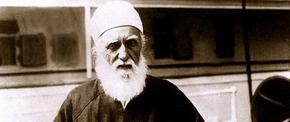The views expressed in our content reflect individual perspectives and do not represent the authoritative views of the Baha'i Faith.
What I really need is to get clear about what I must do, not what I must know, except insofar as knowledge must precede every act. What matters is to find a purpose, to see what it really is that God wills that I shall do; the crucial thing is to find a truth which is truth for me, to find the idea for which I am willing to live and die. – Søren Kierkegaard
The great existentialist philosophers Albert Camus and Søren Kierkegaard focused on how to live in this world in spite of its seeming absurdity.
In fact, their “school” of philosophy, called the Absurdists, mostly contemplated one fundamental reality of human existence: the absurd gap between an apparently endless, meaningless and random universe; and the individual person’s relentless quest to find meaning in that vast universe. This fundamental conundrum produces, Camus and Kierkegaard believed, the disunity and disharmony in our lives.
As human beings, we naturally seek meaning in life. We want to know why. When we can’t find it, the Absurdists concluded, in landmark books like Kierkegaard’s Sickness Unto Death and Camus’ The Myth of Sisyphus, that we have three possible choices: we give up and end our lives; we can believe in a transcendent reality and purpose; or we can reject any larger purpose, accept the absurd and live with it and in spite of it.
It might surprise you to know that Camus endorsed the third way, but Kierkegaard, the founder of existentialism, preferred the second option:
For in human terms death is the last thing of all, and in human terms hope exists only so long as there is life; but… death is by no mean the last thing of all, just another minor event in that which is all, an eternal life. – Kierkegaard, Sickness Unto Death.
How did the Father of Existentialism come to that conclusion? He reasoned that we all had to make a leap of faith, a total commitment of the kind we think of when we fall in love or believe in a true religion. Despite our doubts, Kierkegaard said, we need to a way to hold both belief and doubt in our minds at once. We bridge the absurdity gap, that great distance between what we can prove with tangible evidence and what we feel in our inmost hearts, by accepting doubt as an integral part of belief.
That, of course, is the modern condition. No rational, thinking person lives without doubt. With the rise of rationality and reason, and the huge increase in the general educational levels of the world’s populace, most of us weigh the evidence we have access to and use reason to decide its relative truth. As a result, we doubt ourselves, we doubt others, we doubt our beliefs—that’s a normal, natural component of contemporary life, which the existentialists acknowledge and accept. Kierkegaard recognized it and advised us to accept it, too. He suggested the modern possibility of having both faith and doubt simultaneously, by developing the capacity to hold two opposing ideas in balance at the same time, then by withholding judgment and appreciating the value of both ideas. Only by doing that, Kierkegaard said, can we aspire to become the spiritual beings we are:
This view will doubtless seem to many a paradox, an exaggeration, and a gloomy and depressing view at that. Yet it is nothing of the sort. It is not gloomy; on the contrary, it seeks to throw light upon a subject which ordinarily is left in obscurity. It is not depressing; on the contrary it is uplifting, since it views every man in the aspect of the highest demand made upon him, that he be spirit. – Ibid.
Kierkegaard’s existentialist philosophy, which he largely developed during the same historical period as the emergence of the Baha’i Faith, asks us to set our purpose toward our highest reality, and make the leap of faith that allows it to happen.
In a very similar way—but taking it one giant step further—the Baha’i teachings ask us to transcend the concerns of the individual and the self, and to turn our attention and our actions toward all humanity by living a life of high purpose:
Universal benefits derive from the grace of the Divine religions, for they lead their true followers to sincerity of intent, to high purpose, to purity and spotless honor, to surpassing kindness and compassion, to the keeping of their covenants when they have covenanted, to concern for the rights of others, to liberality, to justice in every aspect of life, to humanity and philanthropy, to valor and to unflagging efforts in the service of mankind. – Abdu’l-Baha, The Secret of Divine Civilization, p. 98.
…thy wish is to become the cause of the illumination of the world of mankind, to promulgate the principle of universal peace, to awake the slumbering and to cause the heedless to become heedful; so that they may be freed from ignorant prejudices, may secure rest and comfort under the shade of the pavilion of the oneness of mankind, may partake of divine bestowals and may become the centre of merciful susceptibilities. There is no purpose higher than this. – Abdu’l-Baha, Star of the West, Volume 6, p. 320.
Next: The Path to Higher Meaning and Purpose in Life

















Comments
Sign in or create an account
Continue with Facebookor